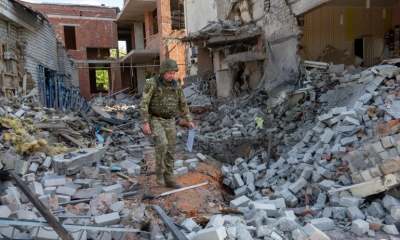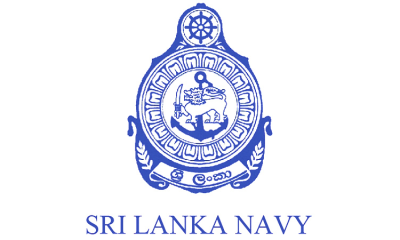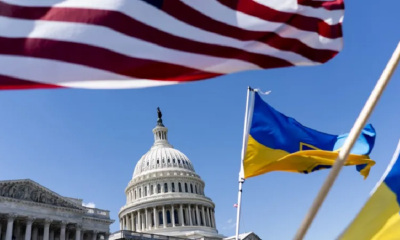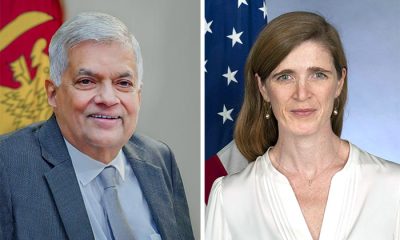Features
Trump in trouble, Boris bolts, Bunga Bunga era ends, King Ranil reigns
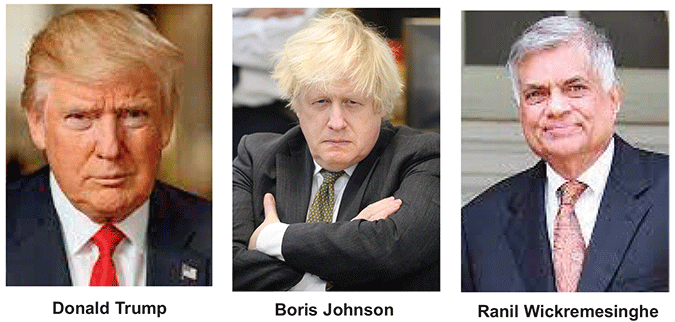
by Rajan Philips
In America, a former President is facing serious federal criminal charges and is banking on a presidential re-election campaign to overcome his legal troubles. Both are unprecedented – both the arraignment of and the re-election effort by a former president, and true to form Donald Trump stands shameless in his lonely infamy. In the UK, a former Prime Minister has quit parliament to escape further scrutiny of and sanctions for his abhorrent behaviour, while wishfully keeping the door open to return as PM even much later. Former Prime Ministers returning to power is not unprecedented in the British parliamentary system, but no predecessor of Boris Johnson has defiled the high office in the way only he could have, and no successor would likely be able to plumb the same despicable depths. There is also no return path to Downing Street for Boris Johnson
Meanwhile in Italy the Bunga Bunga era in the country’s politics and culture came to an end last week with the death of its four-time former Prime Minister Silvio Berlusconi. It was Berlusconi who heralded the rise of perverse populism in western countries and was both a harbinger of and a prototype hybrid between the malignance of Donald Trump and the buffoonery of Boris Johnson. Trump in the US, Johnson in UK and the late Berlusconi in Italy provide a contemporary global backdrop to the unfolding of the Ranil Wickremesinghe presidency in Sri Lanka. While Trump is in trouble, Boris has bolted, and Berlusconi lies in wait for his grand requiem, Ranil Wickremesinghe is quietly morphing into King Ranil of Sri Lanka. He went for the coronation of King Charles, but King Ranil needs no crown to being far more powerful than King Charles.
Caretaker President
Ranil Wickremesinghe became President as a caretaker President, to take care of the economy. I have called him a parliamentary President, and given Sri Lanka’s longest constitutional spell as a hybrid presidential-parliamentary system, it is also appropriate to call him caretaker President. We have had caretaker prime ministers before, and they are so called to highlight their provisional status between the dissolution of an old parliament and the election of a new parliament. In the case of our caretaker President, he is taking care that no elections are held that may disturb his caretaker reign. Which elections will be held and when are entirely a matter of his presidential choosing. He has also extended the scope and tentacles of his caretaker role to go beyond the economy and reach every nook and cranny of the political terrain.
What seems central to King Ranil’s reign is what is being mistakenly called a ‘legal reform’, but actually a scheme to pass a spate of not merely bad but outrightly insidious laws. The list of these insidious laws, still bills, is now common knowledge, and they include – in ABCD order – Anti-Terrorism Bill, Anti-Corruption Bill, Broadcasting Regulatory Commission Bill, the Central Bank Bill, and other (Damn) bills for one or more labour laws. Every one of them is being criticized and condemned by those who are known champions of the “rule of law,” but not the King’s version of “rule by law.” But their concerns are likely to go nowhere because King Ranil has control over a majority parliament comprising all Rajapaksa MPs who are beholden to the King. They may squirm here and there, but throw a few cabinet posts and the Rajapaksa animal kingdom will faithfully follow King Ranil.
During the time of the United Front Government, the then Minister of Justice Felix Dias suddenly found forensic inspiration and directed his officials to review the possibility of doing away with the time honoured writ practice of habeas corpus. The Anglican Minister of Justice was apparently getting tired of the nation’s colonial vestiges. The alarmed officials ran to the Prime Minister, Mrs. Bandaranaike, who threw up her hands and said something to the effect, “What can I do? Go and see Colvin.” They went to Colvin, who threw up his arms and growled, “Leave it with me.” And that was the end of it. No one talked about habeas corpus again, except in courts.
Now, there is no Mrs. B to show the wisdom of leaving it to the experts, and there is no Colvin R. de Silva to bear down on impulsive and/or idiotic ministers. The King calls all the shots and by insider revelations (not that any is needed), there are plenty of idiots in the SLPP and the Cabinet to follow him like sheep. The King’s Minister of Justice is not as clever as Felix, but he seems all ready to enjoy the perks of office, but is not at all ready to take responsibility for all the drafting drivels that are circulated as bills. He laughs them off as mere “drafts,” or worse, “proposals.” The Supreme Court is routinely called upon to edit and correct the poorly drafted but insidiously intended bills. Well-meaning lawyers and commentators are crying foul from the sidelines, but nothing different happens. King Ranil pretends to stay above the fray, but sees to it that whatever he wills is done.
Global Comparisons
What is there in common between King Ranil, on the one hand, and the perverse populists like Donald Trump, Boris Johnson and the late Silvio Berlusconi? To the trio, you may want to add the likes of India’s Narendra Modi, Brazil’s ex Jair Bolsonaro, Turkey’s Erdogan and Russia’s Vladimir Putin, as members of a global club of populist autocrats. Modi is better and worse than the rest of them in his own and different ways. But that is for another day. For now, what is there in common between Ranil Wickremesinghe and the global figures I am referencing? The answer is nothing. It is the differences that are interesting.
At a personal and ethical level, Ranil Wickremesinghe has nothing in common with them. Every one of them, with the doubtful exception Modi, is unethical. They are all scoundrels in more ways than one. It is the same with political corruption, and again Modi is only a doubtful exception. Modi’s and the BJP’s connections to upstart billionaire Gautam Shantilal Adani are universally known and so are allegations of cronyism. The Advani group has been accused of stock market manipulation, and the accusations have not only shrunk the Advani family fortunes, but they have also besmirched Modi’s reputation.
As for Mr. Wickremesinghe, while he is personally honest and may not be a direct beneficiary of political corruption, he is not at all insulated from political corruption. On the contrary, he not merely allows but might even encourage political corruption by those around him. For this, he has had to pay a heavy political price at every turn, but does not seem to have learnt anything from the experience. The 2002 peace process was a direct victim of political corruption, and the mother of all corrupt deals came with the January 2015 Central Bank Bond Scam that proved to be the grave digger that buried the whole yahapalanaya project.
But there has been no show of remorse or recalibration of political action. As I argued some time ago, there is no point in achieving national reconciliation (arbitrarily arresting Gajendrakumar Ponnambalam, the grandson of GG Ponnambalam, is a sure way of botching it) or economic prosperity, while allowing the stables of corruption to continue and without doing anything to apprehend the perpetrators of too many “emblematic” murders.
To get back to the comparator group, Trump, Johnson, Berlusconi and Bolsonaro have no serious political genealogy or commitment to any serious agenda. Their involvement in politics is mainly to satisfy their gigantic egos and serve whatever interests they have that might benefit from state resources. Erdogan and Modi are different. Both have entrenched political agendas predicated on religious fundamentalism and driven by market philosophies. Erdogan’s goal is to transform Kemal Ataturk’s secular Turkey into a religious state, while Modi’s mission is to upend the Nehruvian secularism and make India a Hindutva state where Muslims will not have a significant place. Putin is an outlier and a queer mixture of Tsarist nostalgia and Bolshevik apparatus, although his primary linkage to Bolshevism is mostly biological in that his grandfather was Lenin’s cook. While his foray into Ukraine has terribly backfired, he has been consequentially successful in isolating the West from much of the Global South.
King Ranil’s Political Makeup
Intellectually and politically, Mr. Wickremesinghe has no feel for the Global South. Practically, he wants to curry favour with every country, north or south, and every leader who matter and who might be at odds with one another. That is unavoidable given Sri Lanka’s debt load and economic precarity. The President certainly does not subscribe to the traditional UNP philosophy (under DS at first, and under JR 30 years later) of “Anglo mania and India phobia,” as NM Perera called it at the outset; but what is key to the President becoming King is his domestic philosophy.
His political philosophy, if we might call it so, is mostly family moss gathered over a lifetime. It is not a set of political ideas that are the result of self-reflection and peer-contestation in a political party or organization, and ultimately vetted and validated in praxis. The fact that the UNP has mostly been a one-man band ever since Ranil Wickremesinghe became its leader is one of the main reasons for his current makeup. He is both the cause and the consequence of the corrosion of the UNP.
The UNP and UNP cabinets were not always like this, certainly not under DS Senanayake or under Dudley Senanayake. Even JRJ’s cabinet was a formidable one, but cabinet government (as Jennings explained it) was undone by the presidential system and the rivalries it invariably created among presidentially aspiring ministers. That set the tone for every presidential cabinet that came thereafter. Although it was set up to ensure political stability and facilitate efficiency, the presidential system has produced only chronic instability and dysfunctional chaos.
For all this, Mr. Wickremesinghe has never been a popular politician and has always been a serial loser in elections. In terms of political popularity and electoral success he is nowhere near the rest of the global comparators that I am referencing in this article. Trump won once and lost the second time, but he has solidly behind him an agitated mob of 30 to 50 million Americans. No other American leader in history has had such a loyal and rabid support among the people. Johnson won massively in 2019, and was forced to quit, but he has pockets of support throughout England.
Berlusconi has divided Italy in death just as he had in life.
In a somewhat tongue-in-cheek funeral eulogy at the Duomo, Milan’s Archbishop Mario Delpini spoke of Berlusconi as a notoriety seeking personality who had admirers and detractors, “those who applaud him and those who detest him.” They were both there, supporting and shouting at Berlusconi’s funeral. Erdogan and Modi have had consistently impressive electoral success. Bolsonaro surprised everyone with a strong showing in a close defeat to Lula da Silva in Brazil’s October 2022 presidential election. Putin needs no election, but Wickremesinghe cannot avoid them indefinitely.
Even so, and there is no other way to make this point, none of the other comparators have been able to muster the power and the facility to pass laws, impose regulations, and deploy security forces to thwart protesters, the way Ranil Wickremesinghe is enabling himself to do in Sri Lanka. It is this power and facility that he is unobtrusively exercising that is making me call him King Ranil. Add to them his periodical pronouncements that selectively ridicule opponents and assert the use of state power only in the way that he deems right. Donald Trump could not have passed legislation the way King Ranil is passing them. Boris Johnson won a historic majority in the 2019 election, but now he is gone. Ranil Wickremesinghe lost everything in the 2020 election, but now he is able to do anything and everything that no Sri Lankan President before him has been able to do.
None of the comparator leaders could have delayed or deflected elections the way only King Ranil seems able to do. Putin has power at home but he has powerful forces against him abroad. King Ranil has power at home and influential support abroad, almost of all of which he benefits from because of the economic plight of the Sri Lankan People. Narendra Modi is a powerful Prime Minister but he is constantly circumscribed by State governments that have clout and they are led by non-BJP regional parties. In Sri Lanka, the President, now King Ranil, can play with provincial elections to boost his political position, and he can run the provinces through Governors whom he handpicks.
Only Tayyip Erdogan has been actually able to expand his power base at the state level and within government. He was first elected as Prime Minister and then turned himself into President, similar to, but much later than, what JRJ did in Sri Lanka. Erdogan is not leaving any time soon, but JRJ retired after one and a half terms, half unelected and one elected but only after politically handcuffing Mrs. Bandaranaike. To his credit JRJ retired from office, power and politics, the only Sri Lankan leader to voluntarily forsake power and leave office. By a quirk of circumstances, Ranil Wickremesinghe has become President and seems to be bent on continuing from where JRJ has left. Everyone who came and went in between are not part of the real history of Sri Lanka, a subject about which no Sri Lankan can know more than what the King knows. That is the word according to the King.
In fairness to President Wickremesinghe, my caricaturing him as King should not be taken to mean that he really he means to be a King. Rather, his actions and the ease with which he seems to be getting everything he wants done, objectively make those actions seem to be those of a King. In politics, it is not the subjective intentions of political leaders that matter, but the objective results that flow from their actions. It might be quite the case that President Wickremesinghe thinks that his actions and the laws and regulations that he wants passed will be justified by the economic turnaround that he is anticipating and his forecast of economic prosperity by 2048.
The dreadful prospect, however, is that the economic recovery may not be as swift and as far reaching as the President is expecting, and that the consequences of his political actions may result in bad governments becoming routine and entrenched. Ranil Wickremesinghe could easily avoid all of this by focusing on the economy and not rushing ahead with quite unnecessary legal and political changes that are causing worries not only among his critics but also among those who want him to succeed on the economic front.
Features
The heart-friendly health minister

by Dr Gotabhya Ranasinghe
Senior Consultant Cardiologist
National Hospital Sri Lanka
When we sought a meeting with Hon Dr. Ramesh Pathirana, Minister of Health, he graciously cleared his busy schedule to accommodate us. Renowned for his attentive listening and deep understanding, Minister Pathirana is dedicated to advancing the health sector. His openness and transparency exemplify the qualities of an exemplary politician and minister.
Dr. Palitha Mahipala, the current Health Secretary, demonstrates both commendable enthusiasm and unwavering support. This combination of attributes makes him a highly compatible colleague for the esteemed Minister of Health.
Our discussion centered on a project that has been in the works for the past 30 years, one that no other minister had managed to advance.
Minister Pathirana, however, recognized the project’s significance and its potential to revolutionize care for heart patients.
The project involves the construction of a state-of-the-art facility at the premises of the National Hospital Colombo. The project’s location within the premises of the National Hospital underscores its importance and relevance to the healthcare infrastructure of the nation.
This facility will include a cardiology building and a tertiary care center, equipped with the latest technology to handle and treat all types of heart-related conditions and surgeries.
Securing funding was a major milestone for this initiative. Minister Pathirana successfully obtained approval for a $40 billion loan from the Asian Development Bank. With the funding in place, the foundation stone is scheduled to be laid in September this year, and construction will begin in January 2025.
This project guarantees a consistent and uninterrupted supply of stents and related medications for heart patients. As a result, patients will have timely access to essential medical supplies during their treatment and recovery. By securing these critical resources, the project aims to enhance patient outcomes, minimize treatment delays, and maintain the highest standards of cardiac care.
Upon its fruition, this monumental building will serve as a beacon of hope and healing, symbolizing the unwavering dedication to improving patient outcomes and fostering a healthier society.We anticipate a future marked by significant progress and positive outcomes in Sri Lanka’s cardiovascular treatment landscape within the foreseeable timeframe.
Features
A LOVING TRIBUTE TO JESUIT FR. ALOYSIUS PIERIS ON HIS 90th BIRTHDAY

by Fr. Emmanuel Fernando, OMI
Jesuit Fr. Aloysius Pieris (affectionately called Fr. Aloy) celebrated his 90th birthday on April 9, 2024 and I, as the editor of our Oblate Journal, THE MISSIONARY OBLATE had gone to press by that time. Immediately I decided to publish an article, appreciating the untiring selfless services he continues to offer for inter-Faith dialogue, the renewal of the Catholic Church, his concern for the poor and the suffering Sri Lankan masses and to me, the present writer.
It was in 1988, when I was appointed Director of the Oblate Scholastics at Ampitiya by the then Oblate Provincial Fr. Anselm Silva, that I came to know Fr. Aloy more closely. Knowing well his expertise in matters spiritual, theological, Indological and pastoral, and with the collaborative spirit of my companion-formators, our Oblate Scholastics were sent to Tulana, the Research and Encounter Centre, Kelaniya, of which he is the Founder-Director, for ‘exposure-programmes’ on matters spiritual, biblical, theological and pastoral. Some of these dimensions according to my view and that of my companion-formators, were not available at the National Seminary, Ampitiya.
Ever since that time, our Oblate formators/ accompaniers at the Oblate Scholasticate, Ampitiya , have continued to send our Oblate Scholastics to Tulana Centre for deepening their insights and convictions regarding matters needed to serve the people in today’s context. Fr. Aloy also had tried very enthusiastically with the Oblate team headed by Frs. Oswald Firth and Clement Waidyasekara to begin a Theologate, directed by the Religious Congregations in Sri Lanka, for the contextual formation/ accompaniment of their members. It should very well be a desired goal of the Leaders / Provincials of the Religious Congregations.
Besides being a formator/accompanier at the Oblate Scholasticate, I was entrusted also with the task of editing and publishing our Oblate journal, ‘The Missionary Oblate’. To maintain the quality of the journal I continue to depend on Fr. Aloy for his thought-provoking and stimulating articles on Biblical Spirituality, Biblical Theology and Ecclesiology. I am very grateful to him for his generous assistance. Of late, his writings on renewal of the Church, initiated by Pope St. John XX111 and continued by Pope Francis through the Synodal path, published in our Oblate journal, enable our readers to focus their attention also on the needed renewal in the Catholic Church in Sri Lanka. Fr. Aloy appreciated very much the Synodal path adopted by the Jesuit Pope Francis for the renewal of the Church, rooted very much on prayerful discernment. In my Religious and presbyteral life, Fr.Aloy continues to be my spiritual animator / guide and ongoing formator / acccompanier.
Fr. Aloysius Pieris, BA Hons (Lond), LPh (SHC, India), STL (PFT, Naples), PhD (SLU/VC), ThD (Tilburg), D.Ltt (KU), has been one of the eminent Asian theologians well recognized internationally and one who has lectured and held visiting chairs in many universities both in the West and in the East. Many members of Religious Congregations from Asian countries have benefited from his lectures and guidance in the East Asian Pastoral Institute (EAPI) in Manila, Philippines. He had been a Theologian consulted by the Federation of Asian Bishops’ Conferences for many years. During his professorship at the Gregorian University in Rome, he was called to be a member of a special group of advisers on other religions consulted by Pope Paul VI.
Fr. Aloy is the author of more than 30 books and well over 500 Research Papers. Some of his books and articles have been translated and published in several countries. Among those books, one can find the following: 1) The Genesis of an Asian Theology of Liberation (An Autobiographical Excursus on the Art of Theologising in Asia, 2) An Asian Theology of Liberation, 3) Providential Timeliness of Vatican 11 (a long-overdue halt to a scandalous millennium, 4) Give Vatican 11 a chance, 5) Leadership in the Church, 6) Relishing our faith in working for justice (Themes for study and discussion), 7) A Message meant mainly, not exclusively for Jesuits (Background information necessary for helping Francis renew the Church), 8) Lent in Lanka (Reflections and Resolutions, 9) Love meets wisdom (A Christian Experience of Buddhism, 10) Fire and Water 11) God’s Reign for God’s poor, 12) Our Unhiddden Agenda (How we Jesuits work, pray and form our men). He is also the Editor of two journals, Vagdevi, Journal of Religious Reflection and Dialogue, New Series.
Fr. Aloy has a BA in Pali and Sanskrit from the University of London and a Ph.D in Buddhist Philosophy from the University of Sri Lankan, Vidyodaya Campus. On Nov. 23, 2019, he was awarded the prestigious honorary Doctorate of Literature (D.Litt) by the Chancellor of the University of Kelaniya, the Most Venerable Welamitiyawe Dharmakirthi Sri Kusala Dhamma Thera.
Fr. Aloy continues to be a promoter of Gospel values and virtues. Justice as a constitutive dimension of love and social concern for the downtrodden masses are very much noted in his life and work. He had very much appreciated the commitment of the late Fr. Joseph (Joe) Fernando, the National Director of the Social and Economic Centre (SEDEC) for the poor.
In Sri Lanka, a few religious Congregations – the Good Shepherd Sisters, the Christian Brothers, the Marist Brothers and the Oblates – have invited him to animate their members especially during their Provincial Congresses, Chapters and International Conferences. The mainline Christian Churches also have sought his advice and followed his seminars. I, for one, regret very much, that the Sri Lankan authorities of the Catholic Church –today’s Hierarchy—- have not sought Fr.
Aloy’s expertise for the renewal of the Catholic Church in Sri Lanka and thus have not benefited from the immense store of wisdom and insight that he can offer to our local Church while the Sri Lankan bishops who governed the Catholic church in the immediate aftermath of the Second Vatican Council (Edmund Fernando OMI, Anthony de Saram, Leo Nanayakkara OSB, Frank Marcus Fernando, Paul Perera,) visited him and consulted him on many matters. Among the Tamil Bishops, Bishop Rayappu Joseph was keeping close contact with him and Bishop J. Deogupillai hosted him and his team visiting him after the horrible Black July massacre of Tamils.
Features
A fairy tale, success or debacle

Sri Lanka-Singapore Free Trade Agreement
By Gomi Senadhira
senadhiragomi@gmail.com
“You might tell fairy tales, but the progress of a country cannot be achieved through such narratives. A country cannot be developed by making false promises. The country moved backward because of the electoral promises made by political parties throughout time. We have witnessed that the ultimate result of this is the country becoming bankrupt. Unfortunately, many segments of the population have not come to realize this yet.” – President Ranil Wickremesinghe, 2024 Budget speech
Any Sri Lankan would agree with the above words of President Wickremesinghe on the false promises our politicians and officials make and the fairy tales they narrate which bankrupted this country. So, to understand this, let’s look at one such fairy tale with lots of false promises; Ranil Wickremesinghe’s greatest achievement in the area of international trade and investment promotion during the Yahapalana period, Sri Lanka-Singapore Free Trade Agreement (SLSFTA).
It is appropriate and timely to do it now as Finance Minister Wickremesinghe has just presented to parliament a bill on the National Policy on Economic Transformation which includes the establishment of an Office for International Trade and the Sri Lanka Institute of Economics and International Trade.
Was SLSFTA a “Cleverly negotiated Free Trade Agreement” as stated by the (former) Minister of Development Strategies and International Trade Malik Samarawickrama during the Parliamentary Debate on the SLSFTA in July 2018, or a colossal blunder covered up with lies, false promises, and fairy tales? After SLSFTA was signed there were a number of fairy tales published on this agreement by the Ministry of Development Strategies and International, Institute of Policy Studies, and others.
However, for this article, I would like to limit my comments to the speech by Minister Samarawickrama during the Parliamentary Debate, and the two most important areas in the agreement which were covered up with lies, fairy tales, and false promises, namely: revenue loss for Sri Lanka and Investment from Singapore. On the other important area, “Waste products dumping” I do not want to comment here as I have written extensively on the issue.
1. The revenue loss
During the Parliamentary Debate in July 2018, Minister Samarawickrama stated “…. let me reiterate that this FTA with Singapore has been very cleverly negotiated by us…. The liberalisation programme under this FTA has been carefully designed to have the least impact on domestic industry and revenue collection. We have included all revenue sensitive items in the negative list of items which will not be subject to removal of tariff. Therefore, 97.8% revenue from Customs duty is protected. Our tariff liberalisation will take place over a period of 12-15 years! In fact, the revenue earned through tariffs on goods imported from Singapore last year was Rs. 35 billion.
The revenue loss for over the next 15 years due to the FTA is only Rs. 733 million– which when annualised, on average, is just Rs. 51 million. That is just 0.14% per year! So anyone who claims the Singapore FTA causes revenue loss to the Government cannot do basic arithmetic! Mr. Speaker, in conclusion, I call on my fellow members of this House – don’t mislead the public with baseless criticism that is not grounded in facts. Don’t look at petty politics and use these issues for your own political survival.”
I was surprised to read the minister’s speech because an article published in January 2018 in “The Straits Times“, based on information released by the Singaporean Negotiators stated, “…. With the FTA, tariff savings for Singapore exports are estimated to hit $10 million annually“.
As the annual tariff savings (that is the revenue loss for Sri Lanka) calculated by the Singaporean Negotiators, Singaporean $ 10 million (Sri Lankan rupees 1,200 million in 2018) was way above the rupees’ 733 million revenue loss for 15 years estimated by the Sri Lankan negotiators, it was clear to any observer that one of the parties to the agreement had not done the basic arithmetic!
Six years later, according to a report published by “The Morning” newspaper, speaking at the Committee on Public Finance (COPF) on 7th May 2024, Mr Samarawickrama’s chief trade negotiator K.J. Weerasinghehad had admitted “…. that forecasted revenue loss for the Government of Sri Lanka through the Singapore FTA is Rs. 450 million in 2023 and Rs. 1.3 billion in 2024.”
If these numbers are correct, as tariff liberalisation under the SLSFTA has just started, we will pass Rs 2 billion very soon. Then, the question is how Sri Lanka’s trade negotiators made such a colossal blunder. Didn’t they do their basic arithmetic? If they didn’t know how to do basic arithmetic they should have at least done their basic readings. For example, the headline of the article published in The Straits Times in January 2018 was “Singapore, Sri Lanka sign FTA, annual savings of $10m expected”.
Anyway, as Sri Lanka’s chief negotiator reiterated at the COPF meeting that “…. since 99% of the tariffs in Singapore have zero rates of duty, Sri Lanka has agreed on 80% tariff liberalisation over a period of 15 years while expecting Singapore investments to address the imbalance in trade,” let’s turn towards investment.
Investment from Singapore
In July 2018, speaking during the Parliamentary Debate on the FTA this is what Minister Malik Samarawickrama stated on investment from Singapore, “Already, thanks to this FTA, in just the past two-and-a-half months since the agreement came into effect we have received a proposal from Singapore for investment amounting to $ 14.8 billion in an oil refinery for export of petroleum products. In addition, we have proposals for a steel manufacturing plant for exports ($ 1 billion investment), flour milling plant ($ 50 million), sugar refinery ($ 200 million). This adds up to more than $ 16.05 billion in the pipeline on these projects alone.
And all of these projects will create thousands of more jobs for our people. In principle approval has already been granted by the BOI and the investors are awaiting the release of land the environmental approvals to commence the project.
I request the Opposition and those with vested interests to change their narrow-minded thinking and join us to develop our country. We must always look at what is best for the whole community, not just the few who may oppose. We owe it to our people to courageously take decisions that will change their lives for the better.”
According to the media report I quoted earlier, speaking at the Committee on Public Finance (COPF) Chief Negotiator Weerasinghe has admitted that Sri Lanka was not happy with overall Singapore investments that have come in the past few years in return for the trade liberalisation under the Singapore-Sri Lanka Free Trade Agreement. He has added that between 2021 and 2023 the total investment from Singapore had been around $162 million!
What happened to those projects worth $16 billion negotiated, thanks to the SLSFTA, in just the two-and-a-half months after the agreement came into effect and approved by the BOI? I do not know about the steel manufacturing plant for exports ($ 1 billion investment), flour milling plant ($ 50 million) and sugar refinery ($ 200 million).
However, story of the multibillion-dollar investment in the Petroleum Refinery unfolded in a manner that would qualify it as the best fairy tale with false promises presented by our politicians and the officials, prior to 2019 elections.
Though many Sri Lankans got to know, through the media which repeatedly highlighted a plethora of issues surrounding the project and the questionable credentials of the Singaporean investor, the construction work on the Mirrijiwela Oil Refinery along with the cement factory began on the24th of March 2019 with a bang and Minister Ranil Wickremesinghe and his ministers along with the foreign and local dignitaries laid the foundation stones.
That was few months before the 2019 Presidential elections. Inaugurating the construction work Prime Minister Ranil Wickremesinghe said the projects will create thousands of job opportunities in the area and surrounding districts.
The oil refinery, which was to be built over 200 acres of land, with the capacity to refine 200,000 barrels of crude oil per day, was to generate US$7 billion of exports and create 1,500 direct and 3,000 indirect jobs. The construction of the refinery was to be completed in 44 months. Four years later, in August 2023 the Cabinet of Ministers approved the proposal presented by President Ranil Wickremesinghe to cancel the agreement with the investors of the refinery as the project has not been implemented! Can they explain to the country how much money was wasted to produce that fairy tale?
It is obvious that the President, ministers, and officials had made huge blunders and had deliberately misled the public and the parliament on the revenue loss and potential investment from SLSFTA with fairy tales and false promises.
As the president himself said, a country cannot be developed by making false promises or with fairy tales and these false promises and fairy tales had bankrupted the country. “Unfortunately, many segments of the population have not come to realize this yet”.
(The writer, a specialist and an activist on trade and development issues . )




